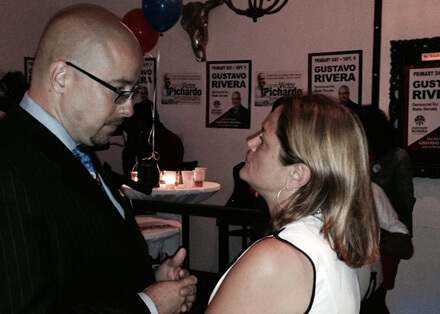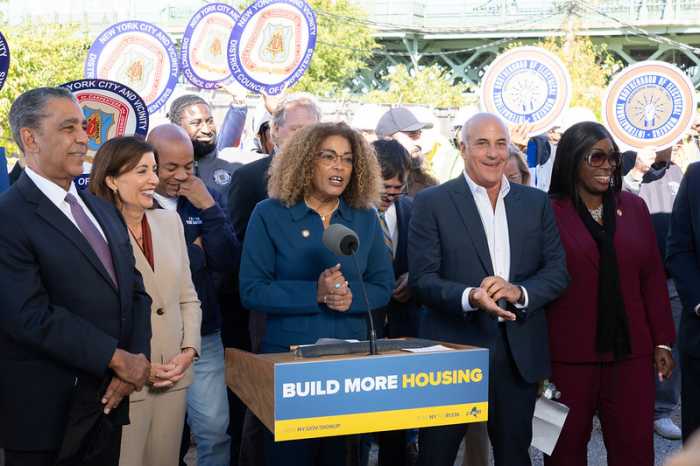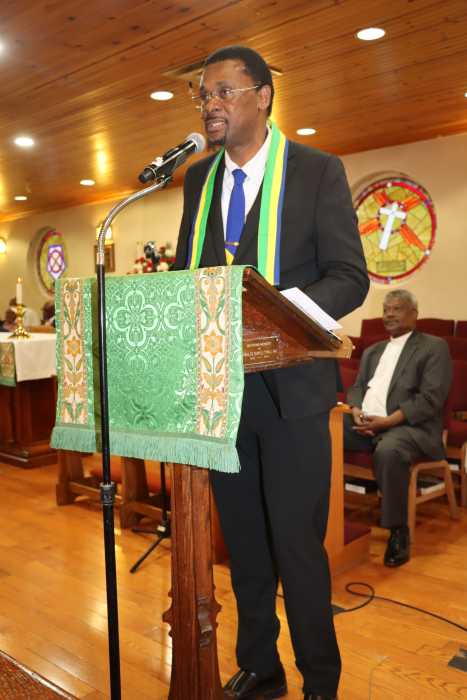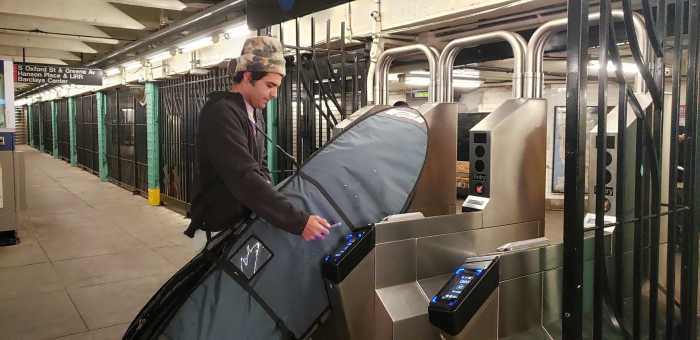State Senator Gustavo Rivera and City Council Speaker Melissa Mark-Viverito chat at Rivera's September 9 victory party. | GAY CITY NEWS
BY PAUL SCHINDLER | When State Senator Gustavo Rivera arrived at the Escape Restaurant & Lounge on Jerome Avenue in the Norwood section of the Bronx to greet happy supporters at about 11 on Primary Night, one of the first hugs he shared was with City Council Speaker Melissa Mark-Viverito.
The warmth between the two elected officials was especially significant given that Rivera’s primary challenger was one of Mark-Viverito’s colleagues, Councilmember Fernando Cabrera.
“I’ve known Gustavo for many years,” the speaker told Gay City News. “He ran one of my campaigns. We’re good friends. And there’s his politics. He’s very progressive.”
Then, too, “there were the recent comments made by my colleague, which I totally disagree with.”
Those comments, contained in a YouTube video (see below) Cabrera produced on a visit to Uganda last winter that only came to widespread attention in the past week, included lavish praise for that nation’s homophobic regime, whose leaders the councilmember described as “the righteous.”
At a time when that government was trying to enact a harshly anti-gay law –– sidetracked at least for the moment by a court ruling –– that includes jail time even for those who fail to report knowledge of homosexual conduct, Cabrera decried the rise of “cultural shifters going after our young.” Those “cultural shifters” –– which he compared to Communists, the Nazi regime, and the North Korean government –– were influential enough in the US, he asserted contrary to fact, that the American government is trying to punish Uganda for not allowing gay marriage.
“We are in the middle of a war,” Cabrera declared from Uganda. “A war for our children.”
Always known for harshly conservative views on social issues –– he was active in the movement to block marriage equality in New York, has ties to the extremist Family Research Council, and is anti-choice –– Cabrera nonetheless sparked fresh outrage when the Uganda video emerged. The Empire State Pride Agenda, LGBT Democratic clubs, and the six gay and lesbian members of the Council urged his prominent supporters –– unsuccessfully in the case of Harlem Congressman Charlie Rangel and Public Advocate Letitia James –– to withdraw their endorsements.
On Primary Night, Rivera said the message from the voters was clear.
“It doesn’t matter where it is –– Brooklyn Heights, the Upper East Side, or the northwest Bronx,” he told Gay City News. “If you espouse hate, it will be rejected by the voters.”
Mark-Viverito echoed that sentiment, saying, “Voters are tired of that. Any type of politics that seeks to exclude is the wrong way to go.”
In a written statement issued later in the evening, Rivera said, “Fundamentally, this race boiled down to a choice for our district between real progressive values that help Bronx families, and the divisive, counterproductive politics of the past. In the end, I'm truly gratified to see that our progressive message won the day.”
In comments to Gay City News, Rivera, who captured roughly 60 percent of the vote, also talked about the “trust” he believes he’s restored to the district, after three successive state senators who found themselves in jail. In 2010, Rivera, running as a progressive and a reformer, defeated incumbent Democrat Pedro Espada, Jr., who is now serving a federal prison sentence for the theft of hundreds of thousands of dollars from a health care non-profit he controlled.
Among those on hand at the Rivera victory party were a group from the Stonewall Democratic Club of New York City –– which like the Jim Owles Liberal Democratic Club endorsed the incumbent senator –– that included Richard Allman, Robert Atterbury, Andy Praschak, and the club’s president, Eunic Ortiz.
According to Ortiz, the Rivera race was one of about a half dozen contests “critical to changing the landscape” where the club focused particular effort in providing volunteer support. Of Rivera, she said he has “the potential to be the face of the future of the New York State Democratic Party.” Emblematic of his leadership, Ortiz explained, is his work on pushing the New York State Dream Act, which would provide opportunities for financial assistance to undocumented immigrants pursuing college study. The bill was scuttled for this year when it failed to win a majority in the Senate against unanimous opposition from Republicans.
Ortiz said news of Cabrera’s Uganda video “helped bring light to what was at issue” in the Senate primary.
Stonewall was less successful in two other Senate primaries where the club backed challengers to members of the Independent Democratic Conference who bolted their party to give Republicans control of the Senate, even though the GOP won only a minority of seats in the last election. Many LGBT advocates blamed the IDC for the Republican leaders’ refusal to bring a vote on the long-stalled Gender Expression Non-Discrimination Act, or GENDA, or on a measure to ban mental health professionals from conducting sexual orientation change efforts on patients who are minors.
In Queens, the IDC’s Tony Avella edged out former City Comptroller John Liu by a 52-48 percent margin. In a district spanning portions of the Bronx and Westchester County, the IDC leader, Jeff Klein, trounced former City Councilmember Oliver Koppell, who also once served in the Assembly and briefly as the state’s appointed attorney general, by a two-to-one margin.
As for Cabrera’s future, Mark-Viverito said a number of her members “have expressed themselves on his comments and I think they speak for themselves.” Given that he was just last year elected to his second four-year term, however, she added, “But we still have to work together.”
Fernando Cabrera in Uganda:


















